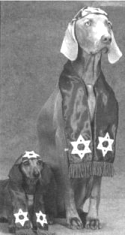|
Terms used on this page:
Goy: (n) Gentile; non-Jew; sometimes said disparagingly, though the Jews themselves are referred to by God as a goy kadosh (holy nation). The term goyim acherim (other nations) found in the Prophets became shortened to goyim (pl. of goy), and then by back-formation, a non-Jew was referred to as a goy.
Goyishe: (GOY-e-sheh) Gentile; Goyish; "Gentilish"; non-Jewish.
Havurah: (CHAV-oo-rah) (Hebrew, from chaver, friend) Fellowship; Association; Group with a common sense of identity or mission.
Mishpochah: (MISH-po-khah) (Hebrew; n) Family. By extension, havurah.
Naches: (NAKH-ess) (Yiddish) Proud pleasure or joy (usually over one's (grand)children).
Ohev Yisrael: (oh-hev-yees-ra-EL) (Hebrew) A lover (or friend) of Israel.
Yiddish: (n) Germanic language spoken by about four million Jews throughout the world. The name Yiddish itself means 'Jewish' and is originally short for yidish daytsh, or 'Jewish German'; an older term in English is Judaeo-German. The language arose in central Europe between the 9th and 12th centuries as an amalgam of Middle High German dialects, incorporating also many Hebrew words. Like Ladino (Judaeo-Spanish), Yiddish is generally written using an adaptation of the Hebrew alphabet. However, Yiddish itself is not linguistically related to Hebrew, despite containing a large component of Hebrew vocabulary.
Return to top
|



